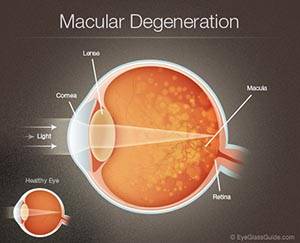Are You Looking for Macular Degeneration Diagnosis in Calgary, AB?
Q&A with Dr. L
Dr. Leong Answers Your Eyecare Questions
What is Macular Degeneration?
Dr. Leong: You may be asking this question if you know someone who has Age-Related Macular Degeneration (AMD). If one of your family or friends have this disease, you are probably aware that it causes loss of central vision due to deterioration of the central area of the back layer of the eye called the macula. AMD causes problems seeing details such as reading, driving, watching TV and in more advanced cases one cannot recognize faces. On a more positive note, peripheral vision remains intact, so people with AMD are still mobile even if they cannot read signs.Risk factors include being over 50 years of age and having family history of AMD. It occurs more commonly in Caucasian females with light coloured eyes. Other controllable risk factors include smoking, lack of exercise which contributes to high blood pressure and high cholesterol. Research also indicates AMD risk from exposure to high levels of UV light and high energy visible light (also known as blue light hazard). Certain medications can also increase risk of a different type of macular degeneration.
Dry AMD may have no symptoms in the early stages. The eye doctor can observe signs in the macula that appear like yellow spots, which are waste products called drusen that the retina cannot clear from the eye. The drusen can become larger and progress to more advanced stages of dry AMD. It may also change from dry to wet AMD, which involves abnormal blood vessel growth damaging the macula in an attempt to supply more oxygen and nutrients to the macula. The new fragile blood vessels in wet AMD typically bleed and cause blood and protein leakage under the macula. If left unchecked it causes irreversible scarring and blindness. Treatment includes laser to the macula or special injections to the eye to prevent further vessel growth.
Q&A with Dr. L
Dr. Leong Answers Your Eyecare Questions
How Can I Prevent Macular Degeneration??
Dr. Leong: Fortunately, there is prevention and treatment for AMD if scarring has not yet occurred. A study called AREDS (Age Related Eye Disease Study) was started in 2001, and AREDS2 results were released in 2013. Compiling over 3000 subjects over 10 years provided data on a special formulation of vitamin supplements that reduced the risk of advanced AMD.
AREDS2 supports supplementation of Vitamin C, E, zinc, lutein and zeaxanthin in patients with intermediate or advanced AMD. AREDS did not find any benefit in taking lutein or vitamin supplements for those who do not have AMD, nor AREDS also showed no benefit in subjects that were already well nourished with lutein in their diet.
An appropriate diet for those at risk for AMD can be found in “Eyefoods” which include food rich in carotenoids such as kale (nature’s sunglasses), orange peppers, spinach, and other examples found in the nutrition tab of our website.
Prevention of AMD can be achieved also by regular exercise, controlling blood pressure and cholesterol levels, no smoking, and wearing sunglasses and blue blocker coatings to block UV light and high energy blue light.
Another controversial preventative measure includes genetic testing for CHF gene (complement factor H) and ARMS2 gene. The research on gene testing suggest that certain nutritional supplements may be appropriate or harmful depending on your genotype.
In our aging baby boomer population, the number of people affected by AMD will increase. Our knowledge about AMD is increasing, and AMD is treatable if detected early enough. Drs. Leong and Bui would be happy to see you and discuss your macular health at your next eye exam.
Read more about macular degeneration symptoms and treatment.
Foresight Eyecare can help your sports game! Book a Sports and Specialty Eyewear fitting and eye exam today in Calgary AB.


Closed on long weekends.
Feel free to contact us if you have any questions or concerns about your eye health. If you require assistance after hours, please dial 811 for further guidance. If you are experiencing an eye emergency after hours, we recommend seeking care at the Rockyview General Hospital's Department of Ophthalmology.
Languages spoken
English, Cantonese, French, Hindi & Punjabi (staff)